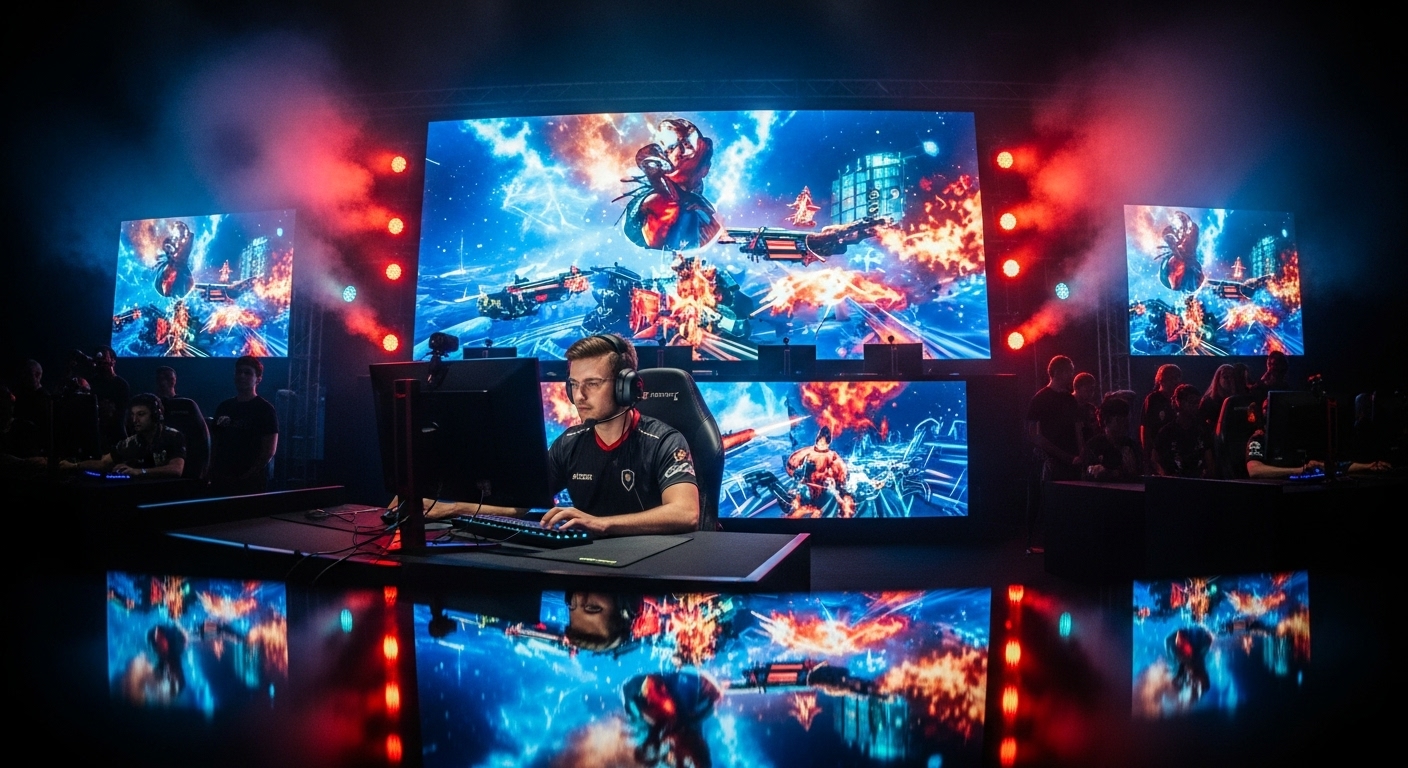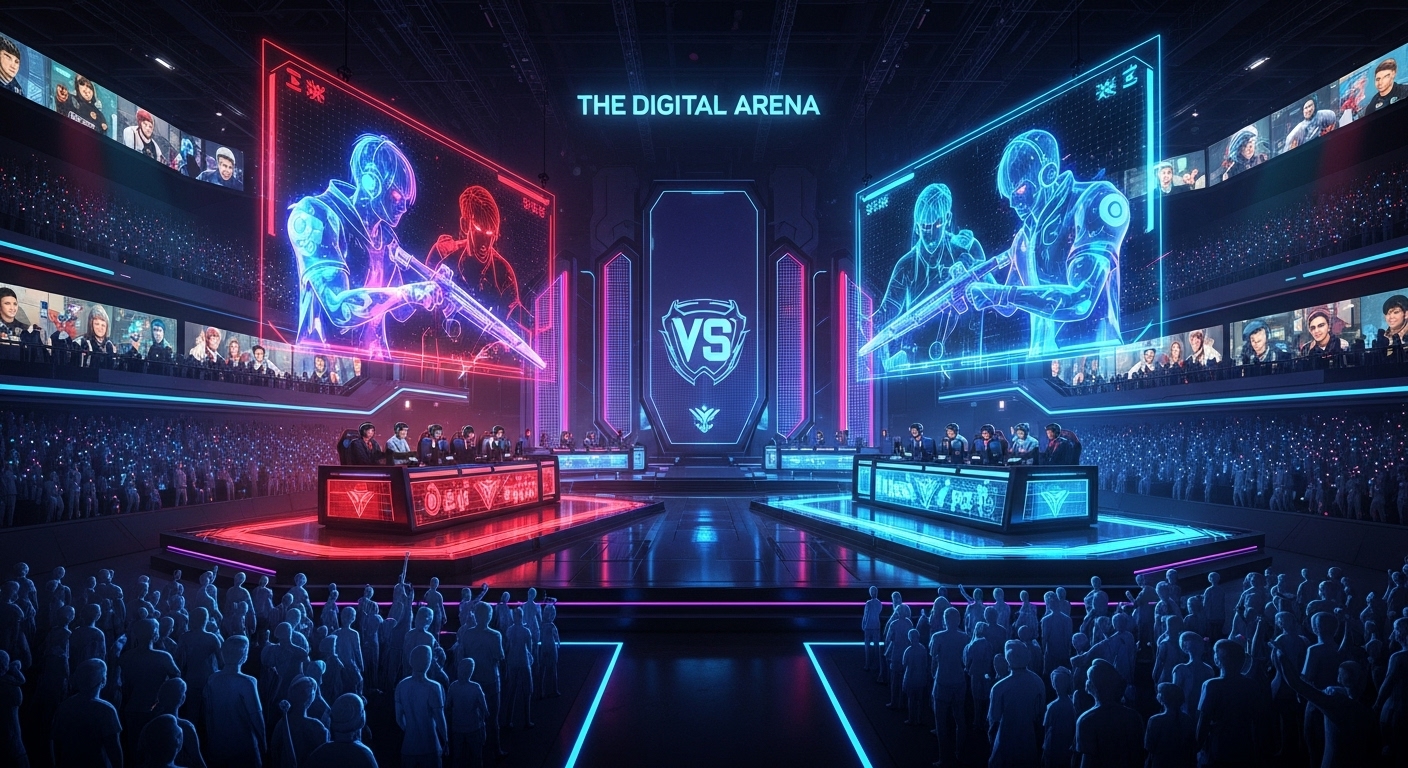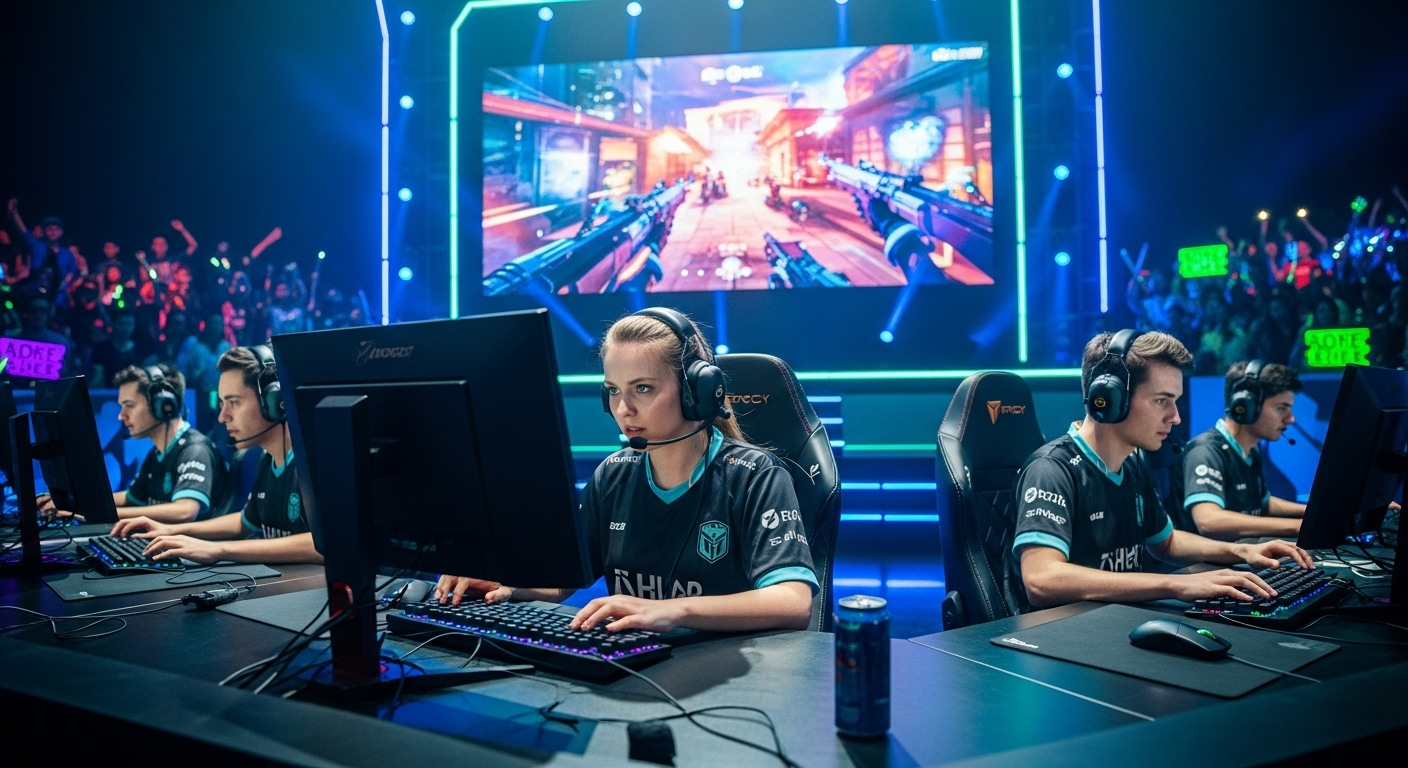Introduction
Esports, short for electronic sports, has emerged as one of the fastest-growing entertainment industries in the world. What began as casual gaming competitions among friends has transformed into a professional, billion-dollar global phenomenon with massive tournaments, sponsorship deals, and professional teams. Esports blends technology, strategy, skill, and community, creating an entirely new type of competitive environment. It attracts millions of players and viewers, redefining how people perceive gaming. Beyond mere recreation, esports has become a career path, a form of cultural expression, and a driver of technological innovation.
This blog explores the history, development, and impact of esports, examining its rise from small-scale competitions to a global industry that rivals traditional sports in viewership and revenue. It also considers the role of players, teams, technology, and the future potential of esports as it continues to shape digital entertainment.
The Origins of Competitive Gaming
Esports traces its roots to the early days of video gaming. In the 1970s and 1980s, arcade games and home consoles provided the first platforms for competitive play. Early competitions, such as the Space Invaders Championship in 1980, drew thousands of participants and spectators, signaling the potential for gaming as organized competition.
As personal computers became more common in the 1990s, multiplayer games like Doom and Quake introduced competitive online play. LAN parties, where players connected computers in local networks, became the early venues for esports tournaments. These gatherings fostered communities of players who shared strategies, rivalries, and a growing passion for competitive gaming.
The rise of the internet in the late 1990s and early 2000s expanded esports beyond local communities. Online multiplayer games allowed players from different cities and countries to compete against one another, laying the foundation for the global esports industry we see today.
The Birth of Professional Esports
The term “esports” gained prominence as gaming competitions became organized and monetized. In South Korea, competitive gaming exploded with the popularity of StarCraft in the late 1990s. Professional players emerged, teams formed, and televised matches drew millions of viewers. The Korean model demonstrated that esports could be both a profession and a spectator sport.
Internationally, tournaments for games like Counter-Strike, Warcraft, and Dota began attracting sponsorships and prize money. Organizations such as the Cyberathlete Professional League in the United States helped formalize the structure of competitions, providing standardized rules, schedules, and ranking systems. The professionalization of esports transformed gaming from hobby to career, allowing skilled players to earn salaries, sponsorships, and fame.
Popular Esports Titles
Esports encompasses a wide range of genres, each with its own fan base and competitive scene. Multiplayer online battle arena games, or MOBAs, like League of Legends and Dota 2, are among the most popular, with tournaments offering multimillion-dollar prize pools. First-person shooters such as Counter-Strike: Global Offensive and Call of Duty emphasize precision, strategy, and teamwork.
Battle royale games like Fortnite and PUBG combine survival skills, quick thinking, and large-scale competition. Sports simulations, including FIFA and NBA 2K, appeal to fans of traditional athletics while bridging the gap between digital and real-world sports. Each game attracts players with different skills and strategies, contributing to the diversity and growth of esports as a global phenomenon.
Esports Organizations and Teams
Professional esports teams are central to the industry’s development. Teams recruit top talent, provide training facilities, and support players with coaching, nutrition, and mental health services. Organizations like Team Liquid, Fnatic, and T1 have become household names in the gaming community, competing at the highest level across multiple titles.
Teams often operate like traditional sports franchises. They maintain branding, merchandise, sponsorship deals, and fan engagement strategies. Player transfers, contracts, and rivalries create a competitive ecosystem that mirrors traditional athletics, elevating esports to a level of professionalism and cultural significance previously unseen in gaming.
The Role of Players and Streamers
Players are the heart of esports. Their skill, creativity, and dedication define the competitive landscape. Top players spend countless hours practicing strategies, improving reflexes, and analyzing opponents. Professional esports athletes are often recognized not only for their in-game talent but also for their sportsmanship, media presence, and personal branding.
Streamers and content creators complement professional competition by connecting with audiences through live broadcasts. Platforms like Twitch and YouTube allow fans to watch gameplay, interact with players, and learn strategies. Streamers help popularize games, grow communities, and transform casual players into engaged viewers, contributing to the ecosystem of esports entertainment.
Tournaments and Competitive Structure
Esports tournaments have grown in scale and sophistication. Events like The International for Dota 2, the League of Legends World Championship, and the Fortnite World Cup attract millions of viewers both online and in-person. Prize pools for these events often reach millions of dollars, reflecting the industry’s rapid growth and financial potential.
Tournaments follow structured formats, including round-robin leagues, knockout stages, and global qualifiers. Ranking systems, seasonal leagues, and regional competitions ensure ongoing engagement and maintain competitive integrity. Professional leagues such as the Overwatch League and Call of Duty League have adopted city-based franchises, further blending esports with traditional sports models.
The Economics of Esports
Esports has become a multi-billion-dollar industry, generating revenue through sponsorships, advertising, media rights, merchandise, and ticket sales. Brands ranging from technology companies to consumer goods invest heavily in esports, recognizing its influence on younger audiences and its potential for global reach.
Sponsorship deals provide financial stability for teams and tournaments, while streaming platforms monetize content through subscriptions, ads, and donations. Esports also contributes to local economies by hosting events in stadiums, arenas, and convention centers, generating tourism, hospitality, and employment opportunities.
Technology and Innovation in Esports
Technology drives esports at every level. High-performance hardware, ultra-fast internet connections, and advanced software enable competitive play. Analytics tools help players and teams analyze performance, optimize strategies, and refine tactics. Virtual reality and augmented reality are beginning to explore new ways to experience esports, creating immersive environments for both players and audiences.
Artificial intelligence is increasingly used for training simulations, strategy development, and audience engagement. Streaming platforms leverage AI to personalize content, recommend games, and enhance viewer interaction. Technology ensures that esports continues to innovate, providing both entertainment and professional opportunities for millions of people.
The Global Impact of Esports
Esports has transcended cultural and geographic boundaries, becoming a truly global phenomenon. Events are broadcast in multiple languages, attracting viewers from every continent. International tournaments foster cross-cultural exchange, uniting players and fans through shared passion.
Esports has also influenced education and career pathways. Universities now offer scholarships for esports players, degree programs in game design and management, and research into competitive gaming. Professional opportunities extend beyond playing, including coaching, broadcasting, marketing, event management, and technology development.
Challenges and Controversies in Esports
Despite its growth, esports faces challenges. Player burnout, mental health concerns, and intense competition create pressures similar to traditional sports. Issues such as cheating, doping, and unfair practices occasionally arise, requiring strict regulation and oversight.
The industry must also navigate intellectual property concerns, monetization ethics, and diversity and inclusion issues. Ensuring fair treatment of players and sustainable growth while maintaining entertainment value is an ongoing challenge for organizations, developers, and governing bodies.
The Role of Community in Esports
Community engagement is a cornerstone of esports. Fans interact with players, streamers, and teams through social media, forums, and live events. Online communities foster collaboration, mentorship, and shared enthusiasm, building loyalty and shaping the industry’s culture.
Community-driven events, tournaments, and fan-created content enhance the ecosystem, creating opportunities for grassroots participation and innovation. Engagement with audiences ensures that esports remains dynamic, inclusive, and culturally relevant.
The Future of Esports
The future of esports promises continued growth and innovation. Advances in virtual reality, cloud gaming, and artificial intelligence will create new ways for players and fans to interact. Expansion into emerging markets will diversify the audience, while educational programs and professionalization will solidify career pathways.
Esports may increasingly integrate with traditional sports, media, and entertainment industries, creating hybrid experiences. Its global reach ensures that esports will continue to influence popular culture, technology, and entertainment for decades to come.
Conclusion
Esports has transformed from a niche hobby into a global cultural and economic powerhouse. It combines skill, strategy, technology, and community to create an immersive and interactive form of entertainment. From local competitions and LAN parties to international tournaments with millions of viewers, esports demonstrates the power of gaming as both profession and pastime.
Its growth continues to reshape entertainment, education, technology, and culture. With professional players, dedicated teams, innovative tournaments, and engaged communities, esports represents a new era of competitive entertainment. The industry is poised to expand further, blending tradition with innovation, and offering opportunities for millions of people worldwide. Esports is more than a game—it is a global phenomenon that redefines competition, creativity, and connection in the digital age.



